Kevin Clarke
Operetta Research Center
27 July, 2020
The other day I had a long transatlantic phone conversation with an US-American operetta researcher I greatly admire for his intense support of the genre, his massive collection which he thankfully shares with others when needed, and for his vast knowledge of the genre’s history. The topic of our conversation was the Ohio Light Opera, and more precisely their Cloclo which has just come out on DVD. As an ardent supporter of OLO the friend expressed his frustration over the fact that I so often dismiss OLO productions as “boring,” reminding me that it would be more helpful to voice “constructive, rather than destructive, criticism.” It got me thinking what a “non-destructive” and ideally “constructive” response to the new Cloclo might be as I sat down and watched the 2 hours 33 minutes performance from Wooster 2018. (For the plot summery and historic background, click here for Kurt Gänzl’s essay.)
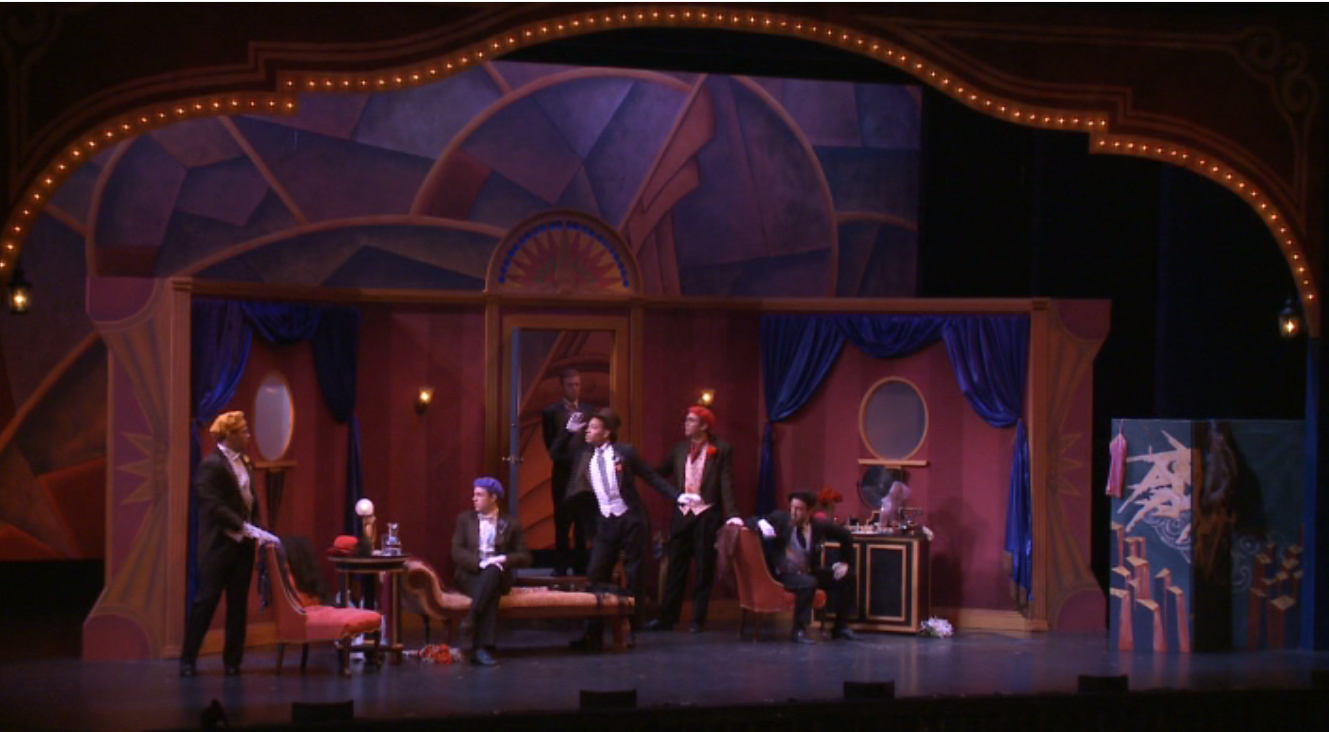
The opening scene of Lehár’s “Cloclo” in the production by Steven A. Daigle at Wooster. (Photo: Ohio Light Opera / Screenshot)
Back on the phone my immediate response was that the most constructive thing I can think of with regard to OLO would be changing the entire artistic management team responsible for the particular look and style of these professional summer festival productions, a look and style that makes me cringe every time I’m confronted with it on CD and DVD (and live) because it seems so outdated and amateurish, things the original shows never were when they premiered. I’d also include the casting director on my wish list for change, not to mention the musical director who is supposed to coach the mostly young singers. With audible results that prove, to me, that the pieces performed by OLO stay way below their potential, even though many of the soloists are highly agile, equipped with attractive voices, and most likely perfectly capable of a different way of singing operetta, if someone asked them to.
Obviously, it always depends on who and what you compare these performances with and what your own “ideal” operetta production is. And that doesn’t just apply to OLO, but to operetta performances all over the world, be it at Gärtnerplatztheater in Munich, Volksoper in Vienna, Baden near Vienna, or Lehár/Strauss done at the Met. Not to mention the many performances released by cpo on disc. It also applies to many beloved older discs still in circulation. To quote The Theater Mania Guide to Musical Theater Recordings (2004): “Operetta albums from decades ago often sound even more dated than the material itself, with white-bread orchestrations and stilted singers.” On the Cloclo DVD you do not get white-bread orchestrations, but you do get a great deal of “stilted” singing (and acting).
This “stiltedness” and the “dated way” of presenting shows in Wooster is in sharp contrast to the breathtaking multitude of titles OLO has dug up over the decades and put on stage with a very limited budget. There is no other operetta festival in the world (!) that presents such a wide spectrum of shows each season (2020 excepted due to Corona), and these shows have ranged from the rare to the ultra-rare in the past, making OLO an eldorado for operetta aficionados wanting to discover the lesser known paths of the genre. Since I am such an aficionado myself, and I definitely love discovering new stuff, I am often torn between wanting to applaud OLO for their truly ground breaking efforts – and what then comes out and gets spread via CDs and DVDs. Even those CDs and DVDs are unique, because which other company – anywhere in the world – has been able to release so much noteworthy material? Which makes it even harder for me feeling so ungrateful about the results. (It’s a bit like my tormented relationship with cpo.)

Caitlin Ruddy as Cloclo in the 2018 production by Steven A. Daigle. (Photo: Ohio Light Opera / Screenshot)
So, to be constructive, I looked up the original 1924 newspaper reviews of Cloclo to see how they evaluated the show and find out if anything from back then might be applied to a production today in terms of helpful guidance. The Reichspost, reporting on the world premiere in Vienna, says that the stars Ernst Tautenhayn, Gisela Werbezirk, and Louise Kartousch are a “triumvirate of humor” and simply “the best”: “the most unique representatives of the genre, reviving anew the tradition of Girardi, Gottsleben and Gallmayer in a sparkling way.”

Gisela Werbezirk in 1935, photographed by Atelier Willinger in Vienna. (Photo: Theatermuseum Wien)
The Arbeiterzeitung claims that Gisela Werbezirk as the morally uptight and love-starved wife of a mayor in the French provinces is of “really unsurpassed comic talent,” especially when she sings and dances. And Miss Kartousch as her adopted “daughter” – who in reality is the mistress of the mayor, working in a Parisian nightclub – appears not only “nude” in the final act, but is also “appealing and grotesque, singing with expression and fire.”

Viennese operetta Louise Kartousch presenting herself like many divas of the day did. (Photo: Edith Glogau / Theatermuseum Wien)
Both ladies together have an act 2 “sex education scene” in which the “mother” tries to explain the nature of love and marriage to her “daughter.” Arbeiterzeitung considered this scene “rather risqué,” while Neue Freie Presse reports that it caused a “stormy roar of laughter.” For them the sex education scene (“Aufklärungsszene”) was “köstlich,” i.e. delicious. And Kartousch as Cloclo – the “little demimondaine” – was “endearingly saucy” and “more than a sentimental soubrette.”
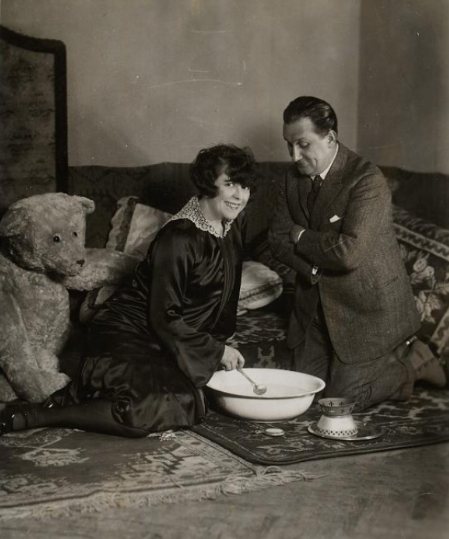
Louise Kartousch and Ernst Tautenhayn, photographed by Atelier Willinger in Vienna. (Photo: Theatermuseum Wien)
In these reviews you find many hints at what is needed to make Cloclo, and many other shows, soar: comic timing, character actors who can dance and be saucy, and who are the best in their field, i.e. stars with charisma and stage presence. What happens today when you apply that principle can be witnessed in productions starring Dagmar Manzel, Max Hopp, Jonas Dassler, Katharine Mehrling or Christoph Marti, not to mention Andreja Schneider, Stefan Kurt, Ades Zabel or Vidina Popov. They can all, in their different way, set an operetta on fire and make it jump off the page. And don’t even get me started on Nicky Wuchinger and Alen Hodzovic who rocked the boat in Vetter aus Dingsda.
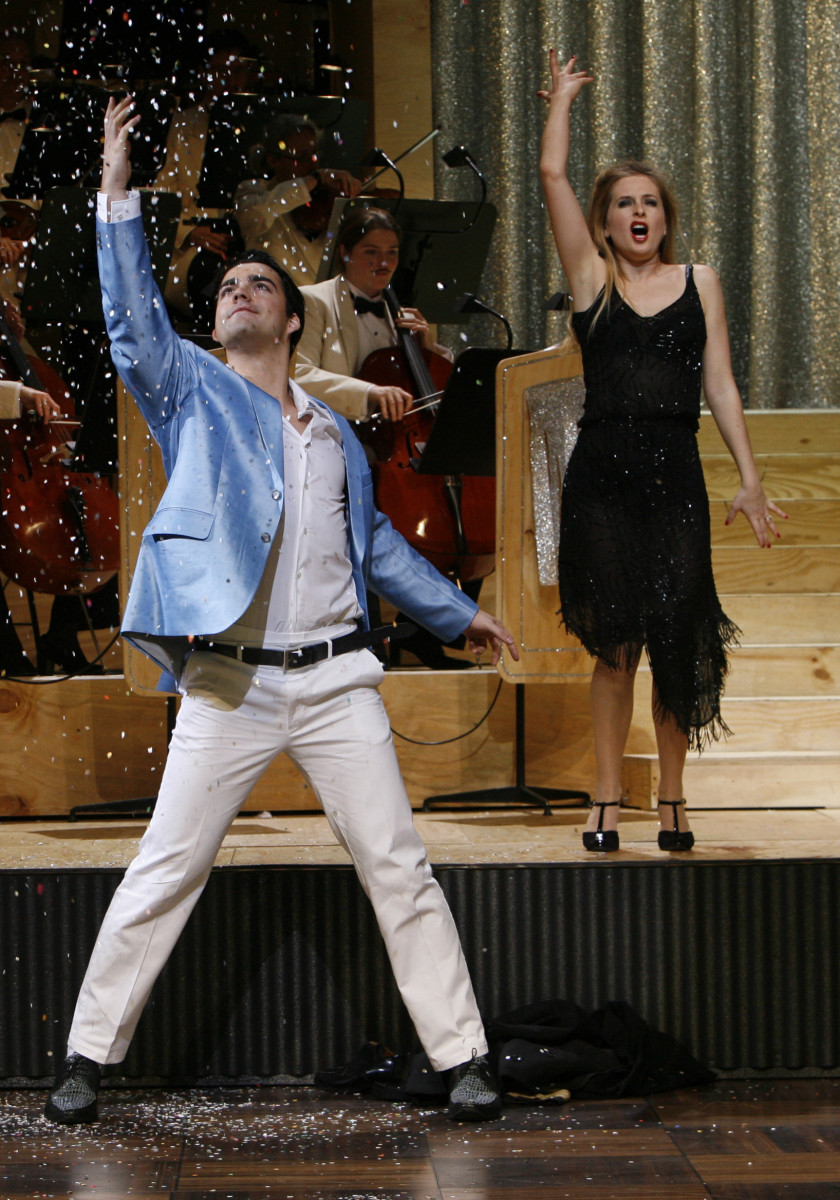
Nicky Wuchinger in “Der Vetter aus Dingsda”. (Photo: Theater Bremen)
Finding performers of that caliber is not easy, but it is possible, especially in the United States where there is so much (young) talent, as can be seen in an endless string of teen musicals and in countless casting shows.
Tracking such talent down and guiding it towards operetta – and operetta festivals – would be a key element of any artistic director’s job description. And then finding a stage and musical director to work with such talents to create something unique.
Adam Benzwi in Berlin has shown, again and again, what a difference intense coaching makes, be it with his students at the Universität der Künste (UdK) when they do operetta, or with people such as Johannes Dunz who really surpassed himself in Perlen der Cleopatra as Prince Beladonis, paying attention to the lyrics and possibilities of the text as seldom heard elsewhere in his own operetta performances.
At Wooster and in Cloclo you hear and see a cast very much unsuited for their roles. And that’s not saying that Caitlin Ruddy in the title role or Yvonne Trobe as Melousine-the-wannabe-mother are bad, or Daniel Neer as the provincial mayor (“daddy”) who suddenly finds his mistress as his daughter in his own house. But each and every one of them is totally miscast because forced to act against type. Which makes their performances look like they are merely walking through the role in a dress rehearsal, singing nicely, but not in character.
Steven A. Daigle as stage director obviously didn’t spend much energy on getting anyone dig a little deeper, and in the sets by Daniel Hobbs this farce of a dancing girl on the run from the police (for slapping an officer) and finding herself in the house of her sugar daddy before landing in jail in act 3 unfolds like a leftover tour production of Terrence McNally’s 1970s The Ritz, but without the subversive fun and without Rita Moreno and F. Murray Abraham stealing scenes from everyone. (And without the steam room and pool.)
The ill fitting costumes by Jennifer Ammons don’t help to make the young lover Benjamin Dutton as Maxime look appetizing. It’s all chaste beyond words, in a show that constantly talks about underwear and how to take it off, a show that set out to be “modern” in a new 1920s way. (It opened almost parallel to Emmerich Kalman’s Gräfin Mariza which was up to date in a different kind of way, and much more successful internationally.)
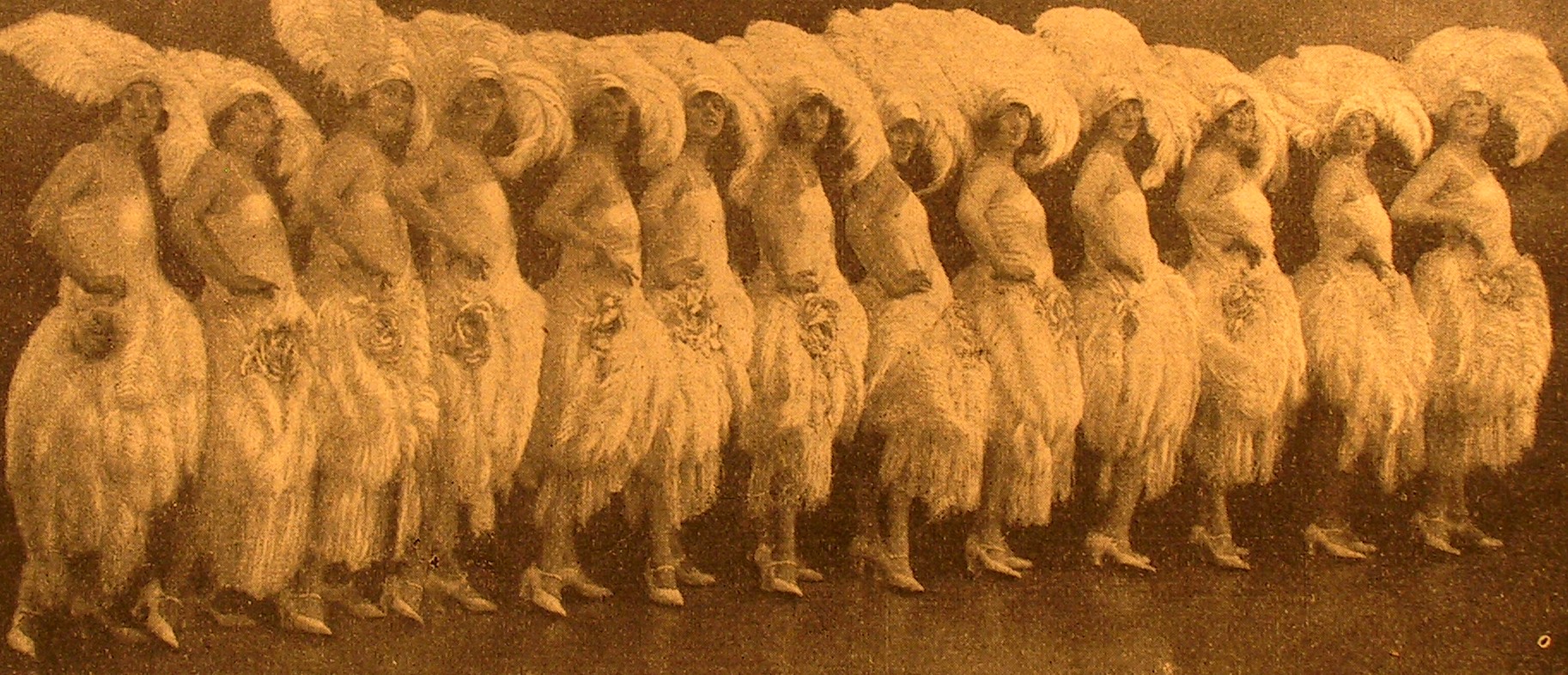
The “Mariza” girls in the 1924 Berlin production. (Photo: Operetta Research Center)
It’s also a show in which Lehár utilizes new dance forms to the max, yet in this OLO production there is hardly any noteworthy dancing. A year later, in 1925, Lehár made a u-turn with Paganini and the Tauber operettas that followed, celebrating the new ideal of the “tragic” and “operatic” operetta, but in Cloclo (to a libretto by Bela Jenbach) he tries, one last time, to stay in touch with the latest trends, before setting his own new trend.

Benjamin Dutton as Maxime with Caitlin Ruddy as Cloclo in 2018. (Photo: Ohio Light Opera / Screenshot)
What could be a “constructive” response to all of this? That the tempi might be a bit more quirky when Lehár writes a Java in act two or a one-step and shimmy elsewhere? That the waltzes need more bounce? No, it’s more fundamental than that. The sensualness of the score (starting with the stunning overture) is never noticeable here, not just because of the slight out-of-tuneness of the orchestra, but because of conductor Steven Byess, an OLO regular who seemingly wants his productions to always sound the same, no matter whether it’s Lehár, Kálmán, Herbert, Strauss or anyone else. And sticking with fundamental aspects: there definitely needs to be inspired choreography to get the entire story bouncing in a different way, from start to finish.
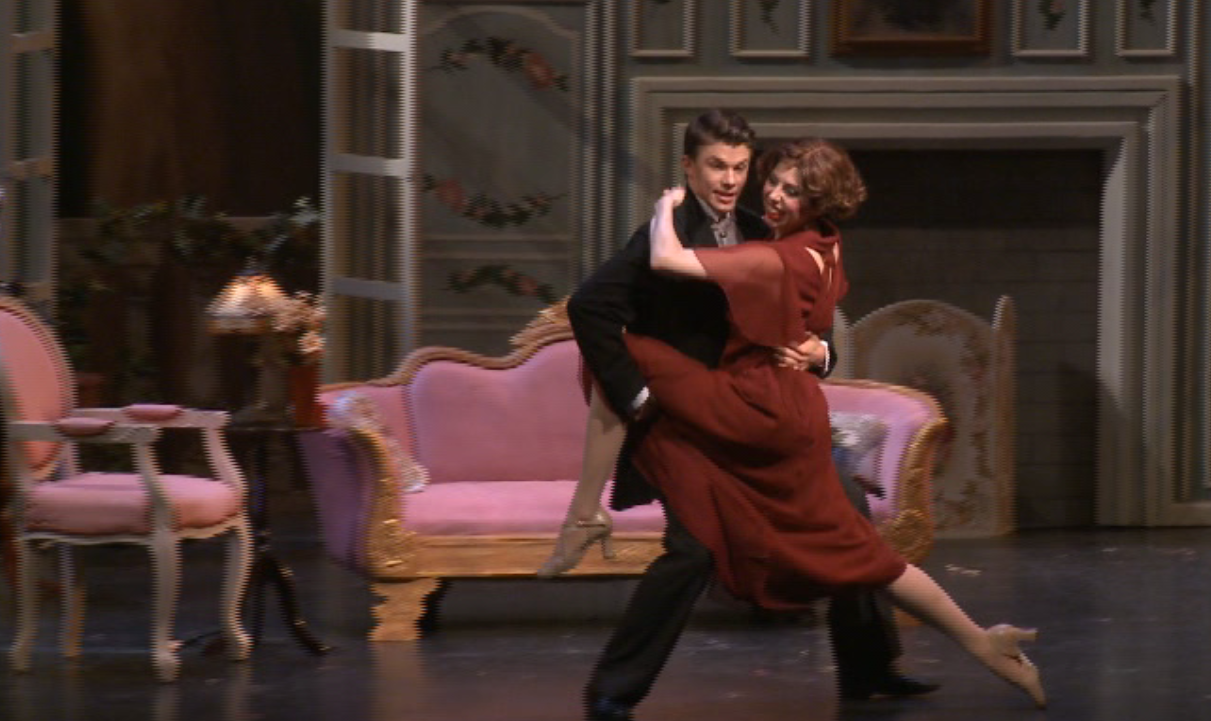
Benjamin Dutton and Caitlin Ruddy doing the “Java” in “Cloclo” act 2. (Photo: Ohio Light Opera / Screenshot)
Watching this show unfold on my TV screen I couldn’t help but marvel at the many wonderful scenes Cloclo contains and what potential each and every one has: the story of a mayor with a mistress, a wife who believes the mistress to be her husband’s illegitimate daughter who she takes in so they could all live as “a happy threesome.”
In the midst of it all, you get Nathan Brian as a hillarious police officer/prison guard who is made up and acts as if he’s straight out of a Murnau silent movie, which brings some jizz into this production. (Mr. Brian can be heard to maximum effect in the new Windy City recording where he delivers an outstanding vocal interpretation.) As does Stephen Faulk as the highly mannered piano teacher Chablis who is supposed to teach Cloclo manners and music. He, too, is over the top in a silent movie kind of way, and he too brings some of that grotesqueness to proceedings that the Viennese newspapers singled out as a key element of Cloclo in 1924. A grotesqueness entirely absent from the rest of the OLO production.
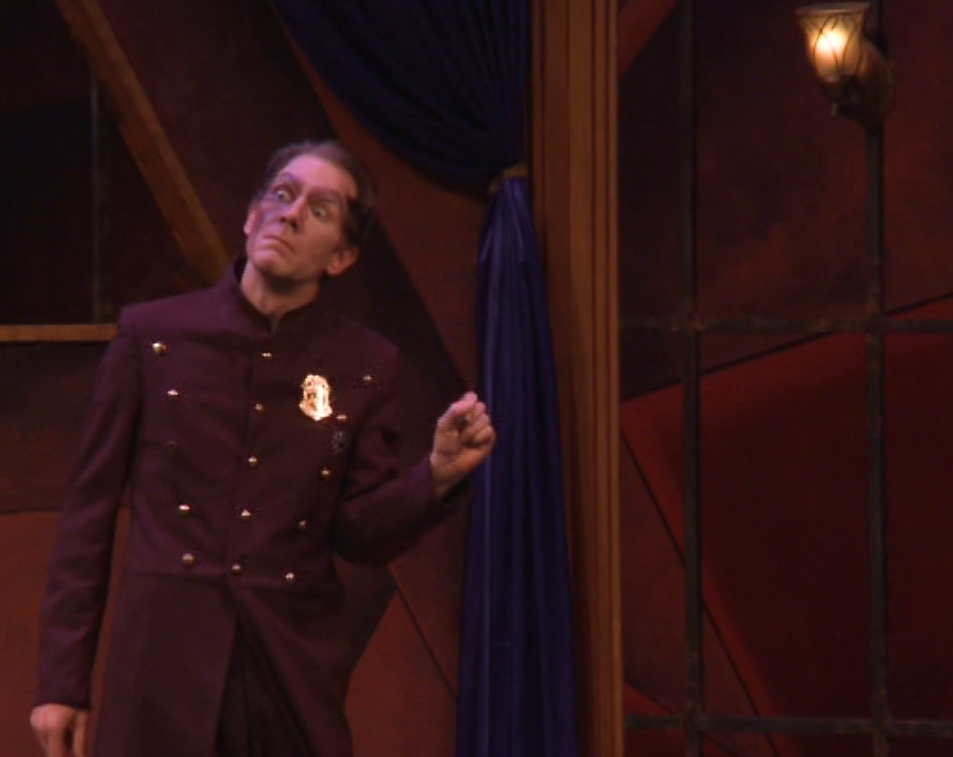
Nathan Brian as the prison guard in “Cloclo” act 3. (Photo: Ohio Light Opera / Screenshot)
Maybe I should simply accept the fact that OLO is an institution which has built its own tradition and style, and that audiences come to enjoy that distinct style, however removed it is from the creator’s original intentions or the original glory of the shows in question. If my idea of an operetta performed in a historically informed way is something else, then maybe I shouldn’t expect to see/hear it in Wooster. After all, Truesound Transfers have released many albums that demonstrate what an alternative operetta style sounds like, YouTube offers endless examples of historic performances that look far more modern than this Cloclo. And the number of recent books outlining the interesting side of the genre and its modernity, even by today’s standards, is thankfully great. Even the English language market seems to have caught on, as is documented by the new Cambridge Companion to Operetta. (To read more about that publication, click here; for an interview with its editor, click here.)

Daniel Neer as Severin and Caitlin Ruddy on the DVD cover of “Clo-Clo.” (Photo: Operetta Archives)
On the plus side, I really came to appreciate the show and fall in love with it via this DVD. Watching it in the OLO version is like reading an old manuscript. You need to use your imagination to see the potential and make it unfold in your own mind. As such, releasing the 2018 performance from Wooster on DVD should be applauded. Maybe it’ll inspire other US companies to put Cloclo on themselves, with a present day Rita Moreno (who’d be an ideal Cloclo) and F. Murray Abraham (who’d be a perfect Severin)? And since the biggest show stopping role is Melousine the wife/substitute mother you really want a Bette Midler type of actress to step into the shoes of Gisela Werbezirk …
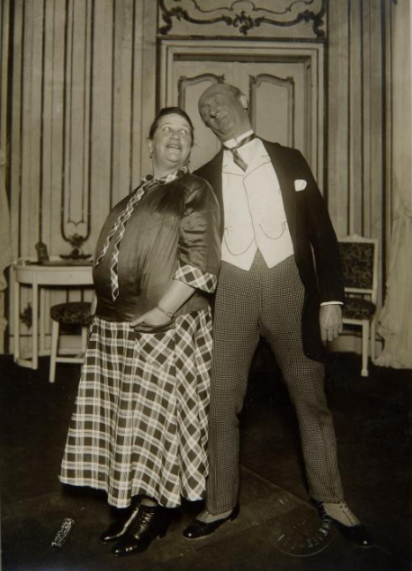
Gisela Werbezirk and Max Brod (who played Severin later) photographed by Atelier Willinger in Vienna, 1929. (Photo: Theatermuseum Wien)
That said, the new CD version of Cloclo in German, released by cpo based on an Ischl festival performance, doesn’t have a Moreno-Abraham-Midler “triumvirate of humor” either. As I said, the above “constructive” criticism doesn’t solely apply to Ohio Light Opera. Ischl and cpo would also benefit from investing a bit more artistic intelligence and effort in their operetta endeavors, and that applies to casting, artistic vision, and musical coaching.
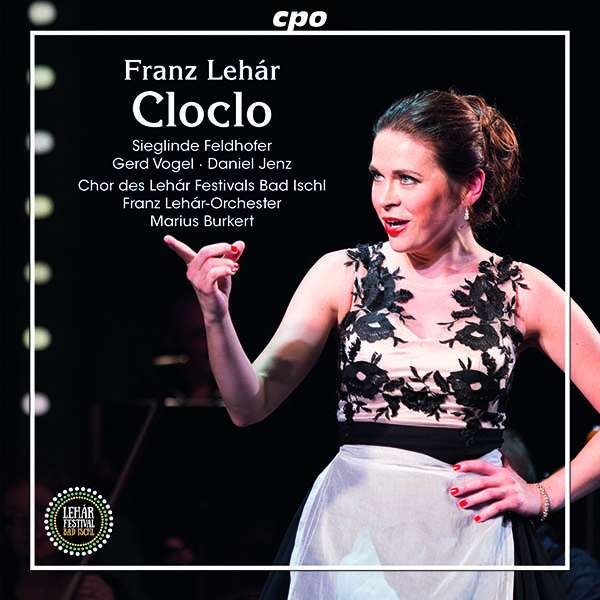
The CD release of Lehár’s “Cloclo,” recored in Ischl in 2019. (Photo: cpo)
You should definitely take a look at the two new Cloclo versions to check out what I mean – and form your own constructive opinion. If you feel like voicing your thoughts, please send your texts or leave comments below.
As a final remark: If you have little money, as a company, there is nothing wrong with presenting shows in a minimal way. That, however, should ideally go hand in hand with some kind of inspired and unique staging and/or casting. Because of the world seeing what OLO does, thanks to the many DVDs that have come from there, these productions should be a role model and more than a “routine” handling of long forgotten titles. Maybe then the international press – from The New York Times to Opernwelt – will take serious note of OLO’s serious enterprise and review not only the summer seasons but also the various CDs and DVDs that originate there. After all, they themselves claim to be “America’s Premier Lyric Theater Festival.”
The shows in question would deserve such premiere league reviews, Cloclo included. Because operetta has been kept under the radar for far too long, it needs discussion, controvery, passion and personality. Things it originally had in abundance. (For more details, read the interview with Laurence Senelick on Jacques Offenbach and the Making of Modern Culture.)
To order the DVD, click here.

My reaction to this is that the main “problem” with OLO’s CloClo is one beyond the power of OLO or any company to correct.
To put it quite directly, CloClo is simply not a memorable show. I attended one of the 2018 performances in Wooster and came away with just three favorable impressions from the whole work: a graceful waltz, a spirited mazurka, and absolutely beautiful orchestrations. The plot, the lyrics, the dialogue and yes, the music: all quite unmemorable. (Much) lesser Lehar indeed. I’m glad to have seen it once, but I would really not be interested in seeing it again.
Audiences don’t always get it right; witness the decades it took for Fledermaus to be appreciated in the USA. However, in the case of CloClo, my reaction to the show is supported by public reaction when the show was new. As soon as the novelty wore off, the show died. And when CloClo was staged in London, Lehar’s music for Act III was jettisoned in favor of music by a couple of total unknowns. There is a message there, loud and clear.
OLO has never done Eva or Wiener Frauen, both of which contain considerable music right out of Lehar’s top drawer. And they have not staged Guiditta or Gypsy Love since the 1990s. Why they thought CloClo deserved preference over these four musically superior works is known only to them.
That said, I’ll always be grateful to OLO for the opportunity to see operettas I never thought would be staged in this country. Putting on seven shows of varying styles over a period of seven weeks is a herculean accomplishment. If some of the critics tried it themselves, I doubt most or all of them would do anywhere nearly as well.
Dear Kevin or Dear Mr. Klarke,
don’t be angry with me if I say I did like Olo’s CLOCLO and I’ll be happy to watch it again and again.
I like the music even if it is not to be compared with EVA or DIE BLAUE MAZUR. Oh yes! Lehar was always a composer who never failed to offer pleasant music and what’s more important to offer wonderful orchestrations. I do NOT love operettas when certain assassins change the original orchestrations. I think the Komische Oper Berlin should not exist – their PERLEN VON CLEOPATRA is so far from the Straus operetta that puts the world of operetta to shame. But the public applauds (the television has taught such a way).
Mr. Chamberlin says right words in his comments.
May I say that you are – dear Mr. Clarke – kind of evil with regard to OLO. Their CLOCLO is so pleasant and does not look ‘old’, it’s also kinda Broadway musical (as in the old good days … I stopped to see what happens there; my last joys were the Jule Styne’s musicals) – the interpreters are alive and sincere, and – oh yes – Steven Faulk and Nathan Brian use – as always – their intelligence, providing ‘something more’ but it is also inexcusable Sara Best’s laughing1 I believe this OLO’s CLOCLO is even better that THE MERRY WIDOW at the Met … and what about DIE LUSTIGE WITWE at the Staatsoper in Wien? Disgusting. So OLO never offend the operetta, as it often happens here in Europe.
I have now to wait till next summer to enjoy DIE JUXHEIRAT, another forgotten Lehar’s work … there will be another opportunity to discover how Lehar had always his magic way of offering pleasant work even if not so ‘perfect’ as his WITWE.
I repeat that operettas for me (am I wrong?) are great musical works because of their original orchestrations and to change that original sound is to betray them. DIE LUSTIGE WITWE or DER RASTELBINDER or …. the list may indeed be very long … are works that may stay perfectly well together with LA BOHEME, ERNANI, BILLY BUDD, CARMEN …
Smile at me, Kevin, and here a handshake.
Ernesto